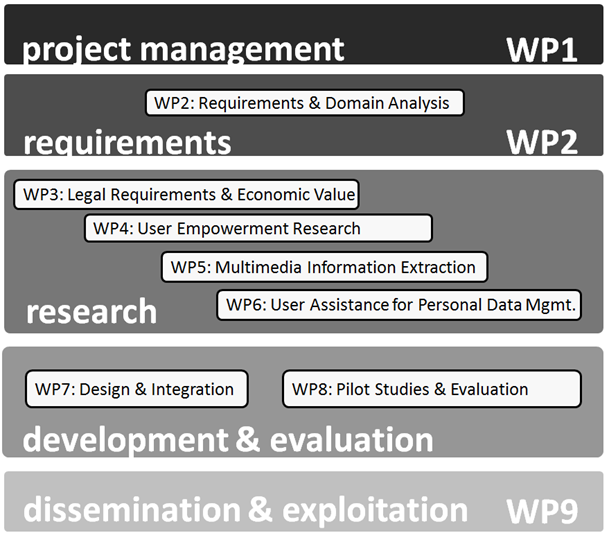USEMP work structure
USEMP is planned as a 36-month project. Use case analysis and requirements will be realised at the beginning of the project. Legal studies will be realised the first 24 months of the project. User research is planned split in two main phases, with the first focused on lab studies and the second focused on living labs experiments. Correspondingly, technical research and development are iterative and organised in two distinct phases in order to allow quality assessment of project results and retuning of activities. Evaluation will be performed mainly through living labs studies but also through quantitative evaluation of the methods and algorithms devised. Both phases are organised in cycles design, research, implementation and evaluation.
USEMP work illustrated in the Figure below is organised in nine Work Packages, including a specific WP dedicated to Project Management (WP1) for coordinating, steering the project, and interfacing with the EC. RTD-focused WPs are structured into four orthogonal activity types: (1) Requirements and domain analysis, (2) Research, (3) Development and Evaluation, and (4) Dissemination & Exploitation.
Requirements and Domain Analysis is handled by WP2 that delineates the research directions based on the requirements stemming from an in-depth analysis of the personal data sharing domain. WP2 is also tasked with the codification of requirements in a common form in order to enable the formulation of a common research framework for the project. Core research activities are conducted in four research work packages, each of which is focused on one of the four scientific dimensions of the USEMP framework: (1) Legal Requirements and Economic Value (WP3), focusing on the regulatory framework around personal data and on its perceived value, (2) User Empowerment Research (WP4), focusing on an improved understanding of personal information sharing through an array of user studies, (3) Multimedia Information Extraction (WP5), focusing on devising innovative information extraction methods and on adapting them to an user empowerment usage scenario, and (4) User Assistance in Personal Data Sharing (WP6), aiming at the development of semiautomatic mechanisms that improve user’s control and awareness of shared personal data. Development and integration will be carried out by WP7, focusing on the integration of recommendations and services delivered from the research work packages into a common prototype, and its real-world instantiation and evaluation through the project use cases (WP8).
Finally, Dissemination and Exploitation activities will be carried out within WP9 with the goal of disseminating the project knowledge and results into research and industrial communities, and that will ensure the maximum possible exploitation of the developed tools and platform.

